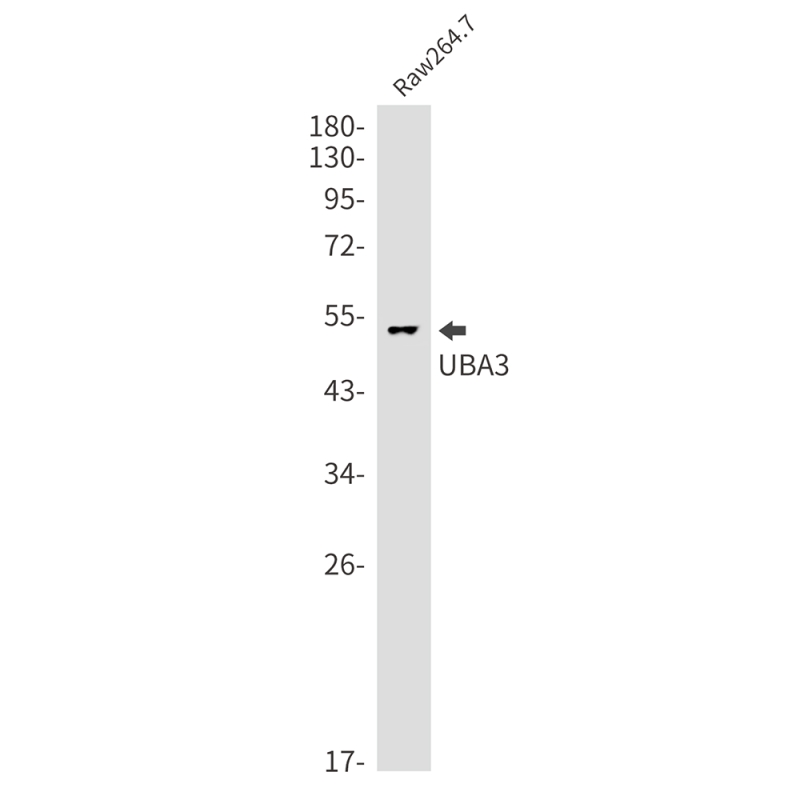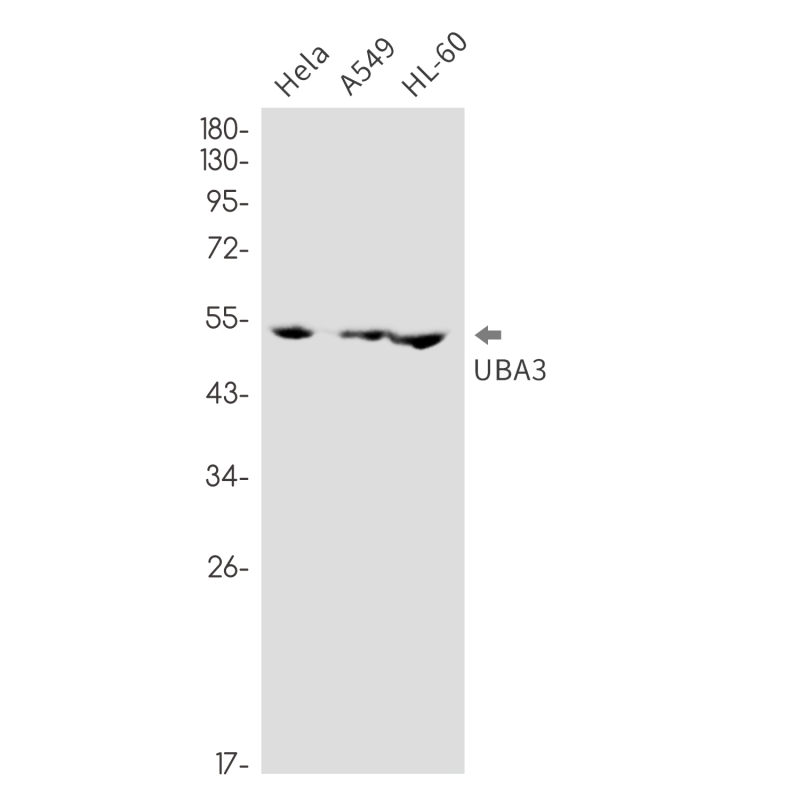

| WB | 1/500-1/1000 | Human,Mouse,Rat |
| IF | 咨询技术 | Human,Mouse,Rat |
| IHC | 咨询技术 | Human,Mouse,Rat |
| ICC | 技术咨询 | Human,Mouse,Rat |
| FCM | 咨询技术 | Human,Mouse,Rat |
| Elisa | 咨询技术 | Human,Mouse,Rat |
| Aliases | NAE2; UBE1C; hUBA3 |
| Entrez GeneID | 9039 |
| WB Predicted band size | Calculated MW: 52 kDa; Observed MW: 52 kDa |
| Host/Isotype | Rabbit IgG |
| Antibody Type | Primary antibody |
| Storage | Store at 4°C short term. Aliquot and store at -20°C long term. Avoid freeze/thaw cycles. |
| Species Reactivity | Human,Mouse |
| Immunogen | A synthetic peptide of human UBA3 |
| Formulation | Purified antibody in TBS with 0.05% sodium azide,0.05%BSA and 50% glycerol. |
+ +
以下是3篇关于NEDD8 Activating Enzyme E1C抗体的参考文献及其摘要概括:
1. **"Structural basis of NEDD8 activation by the APPBP1-UBA3 heterodimer"**
- **作者**: Kumar et al. (2011)
- **摘要**: 该研究解析了NEDD8激活酶E1(由APPBP1和UBA3/E1C亚基组成)的晶体结构,阐明了其催化NEDD8与底物结合的分子机制,并验证了特异性抗体在检测E1C亚基构象变化中的应用。
2. **"Inhibition of NEDD8-activating enzyme induces rereplication and apoptosis in human tumor cells"**
- **作者**: Huang et al. (2010)
- **摘要**: 研究利用针对E1C亚基的抗体,证明抑制NEDD8激活酶可通过阻断Cullin蛋白的neddylation,导致肿瘤细胞DNA复制异常和凋亡,为抗癌药物开发提供依据。
3. **"Substrate-assisted inhibition of ubiquitin-like protein-activating enzymes"**
- **作者**: Brownell et al. (2010)
- **摘要**: 通过抗E1C抗体的免疫沉淀实验,揭示了小分子抑制剂MLN4924选择性阻断NEDD8激活酶的机制,并验证了其在调控蛋白酶体降解通路中的功能。
4. **"MLN4924. a NEDD8-activating enzyme inhibitor, blocks protein neddylation in acute myeloid leukemia cells"**
- **作者**: Swords et al. (2013)
- **摘要**: 使用E1C特异性抗体进行Western blot分析,证实MLN4924可抑制AML细胞中NEDD8通路,导致癌蛋白积累和细胞周期停滞,提示靶向E1C的临床潜力。
The NEDD8 Activating Enzyme E1C (also known as UBA3 or NAE1C) is a critical component of the NEDD8 activation pathway, which regulates the post-translational modification process called neddylation. This enzyme, along with its partner subunit APPBP1 (NAE1), forms the heterodimeric E1 enzyme responsible for activating NEDD8. a ubiquitin-like protein. Neddylation primarily targets cullin proteins in Cullin-RING E3 ubiquitin ligases (CRLs), modulating their activity and substrate specificity. CRLs play essential roles in protein degradation, cell cycle progression, DNA repair, and stress responses.
Antibodies targeting NEDD8 Activating Enzyme E1C are vital tools for studying neddylation mechanisms and associated pathologies. They enable researchers to detect protein expression levels, assess subcellular localization, and investigate interactions within the neddylation cascade. Dysregulation of this pathway has been linked to cancers, neurodegenerative diseases, and inflammatory disorders, making E1C a potential therapeutic target. Small-molecule inhibitors like MLN4924 (Pevonedistat), which blocks NAE1/NAE1C activity, are under clinical investigation for cancer treatment.
These antibodies are widely used in techniques such as Western blotting, immunoprecipitation, and immunohistochemistry. Validating their specificity through knockdown/knockout controls ensures accurate interpretation of experimental results, particularly in studies exploring E1C's role in disease progression or drug development.
×